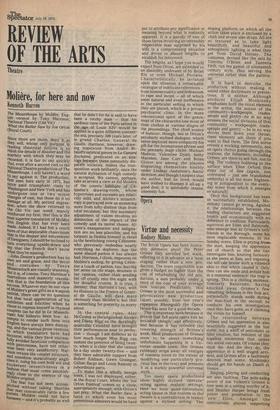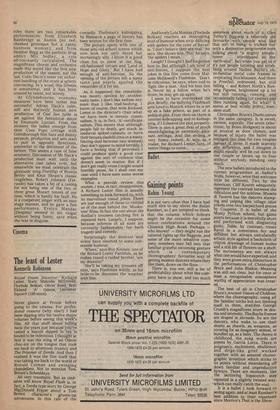Opera
Virtue and necessity
Rodney Milnes
The Royal Opera has been noticeably defensive about the Peter Grimes they unveiled last week, referring to it in advance as a 'new staging' rather than a new production. The team responsible was given a budget no higher than the cost of refurbishing the old production, a sum probably under a third of the cost of your average new venture. Predictably, this Grimes is the most successful and provocative new production (apart, possibly, from last year's expensive Rheingold) the Opera House has seen for a good decade.
This is important both because it proves that full-scale opera can be mounted cheaply and effectively, and because it has revealed the towering strength of Britten's work. Most productions of Grimes seem to be about something unfortunate happening in a Victorian seaside town; this Grimes ruthlessly strips away all vestiges of cosiness (even to the extent of modifying one particularly precious line in the text) and presents it as a starkly powerful universa myth. Too many opera productions show highly stylised 'operatic acting against realistic settings Here we have quasi-naturalistic acting (quasi in that realism in the theatre is a contradiction in terms against a stylised setting. The sloping platform on which all the action takes place is enclosed by a cloth and severe side drops. All are so textured as to take light beautifully, and beautiful and atmospheric lighting is what they get from David Hersey. The costumes, devised like the sets by Timothy O'Brien and Tazeena Firth, run the gamut of nineteenth century style, thus serving the universal rather than the particular.
It is hard to describe the production without making it sound either doctrinaire or pretentious. It is neither. Although producer Elijah Moshinsky emphasises both the ritual element in the action, the notion of the community—workpeople, tradespeople and gentry—he in no way stresses the social divisions of that community — workpeople, tradespeople and gentry — he in no way shoves them down your throat; these elements are there if you want to find them. The first scene reveals a working community, not an opera chorus going through the motions; the fishermen, including Grimes, are there to sell fish, not to sing. The violence bubbling to the surface when Ellen Orford first steps out of line (again, not overstated — just one brandished umbrella) is all the more frightening in juxtaposition to the everyday scene from which it emerges so naturally.
Once this background has been so successfully established, Moshinsky cannot go wrong. Against it, the relationships between the leading characters are suggested freshly and economically with no deference to tradition. Particularly equivocal are Ellen and Balstrode, who emerge less as Grimes's only friends in the Borough, more his most implacable enemies. In the Sunday scene, Ellen is prying from. the start, keeping the apprentice out of church so that she can interrogate him, knitting furiously as she peers at him, and exposing the tell-tale bruise with a violence akin to that which caused it. Only then can she smile and enfold him in a maternal embrace: the trap is sprung. This is a chilling moment. Similarly Balstrode, having knocked away Grimes's few remaining defences in the first act, purposefully stands aside during the man-hunt in the second; he conducts his own investigation once they have gone, as if claiming the victim for himself.
The relationship between Grimes and his apprentice is also beautifully suggested in the hut scene: not a whiff of sentiment or false emotion, but redolent of the hopeless tenderness that unites two social outcasts. Of course they must die. And die they do, the apprentice in a well staged accident, and Grimes after a faultlessly directed mad scene. Moshinsky should get his hands on Death in 1 Venice.
Singing, playing and conducting ' are also faultless. The pole-axing power of Jon Vickers's Grimes is . now seen in a setting worthy of it, and Heather Harper brings fresh power and penetration to the ) 'new' Ellen. Amongst the meticulously played supporting roles there are two remarkable performances: from Elizabeth Bainbridge as Auntie (no redcheeked grotesque but a canny business woman), and from Heather Begg as the pathetic drug addict Mrs Sedley, a role all-too-easily caricatured. The magnificent chorus and orchestra made this sound like the first new production of the season, not the last. Colin Davis's tense yet unhurried handling of the score is utterly convincing. In a word, this Grimes is sensational, and it has been created by talent, not money. At Glyndebourne, economy measures have been rather less successful. Adrian Slack's calm, still and distinctly human new production of Cosi fan tutte is set against the fantastical decor by Emanuele Luzzati. From the moment the ladies emerge from their Casa Pupo cottage with Gainsborough film hats and dainty parasols, production and sets start to pull in opposite directions, somewhat to the detriment of the former. This seems a case of false economy. Discussion of Mr Slack's production must wait until the alternative cast takes over, but meanwhile we must celebrate the gloriously sung Fiordiligi of Bozena Betley and Knut Skram's classic Guglielmo. Robert Johnson (Ferrando) has taken a bit of a caning for not being one of the two or three great Mozart tenors of our time, which is hardly his fault. He is a competent singer with an easy stage manner, and he gave a fine performance. Evelyn Mandac (Despina) seemed to me vulgar without being funny, save when she was in disguise.



































 Previous page
Previous page